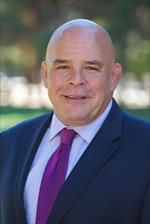- About
- Organization
- Organization Overview
- Dean’s Office
- Department of Bioengineering and Therapeutic Sciences
- Department of Clinical Pharmacy
- Department of Pharmaceutical Chemistry
- Quantitative Biosciences Institute
- Org Chart
- Research
- Education
- Patient Care
- People
- News
- Events
Burchard to Deliver Academic Senate Lecture

Esteban G. Burchard, MD, MPH
To round out the department trifecta of major award announcements this month, please join me in congratulating Esteban G. Burchard, MD, MPH, for being selected to give the Academic Senate’s Faculty Research Lecture in Clinical Science. Being recognized by your department and university colleagues is one of the greatest honors you can receive, and this award is a testament to Esteban’s major contributions to the mission of UCSF through his impactful research.
Esteban is internationally recognized for his contributions to our understanding of the genetic basis of population differences in pulmonary diseases and drug response, and the critical interactions between genes and environment that drive health disparities in our country. His research has been focused on understudied LatinX and African American populations. He is a tireless advocate for increased research to address health disparities and is a leading voice nationally for the inclusion of non-White populations in human genetics. His research is highly collaborative and he is an outstanding mentor to a diverse group of trainees. His lab reflects the type of diversity that is the goal for UCSF and the broader biomedical research enterprise.
I wanted to share with you a few quotes from his nomination packet that I think nicely reflect Esteban’s accomplishments and highlight why he is so deserving of this award:
- “In a Nature article he co-authored in 2011, Esteban risked jeopardizing his NIH funded studies by publicly challenging the NIH for its feeble compliance with its own 1985 mandate for the inclusion of diverse subjects in its studies. Records then showed that in 26 years, only 7% of GWAS included minorities, with the hint that such inequity was caused by the institution’s perceived bleak financial support for minority population studies.”
- “Esteban and his colleagues provided concrete demonstration of the importance of effects of ancestry on gene by environment effects on disease risk. In a meta-analysis of about 17,000 individuals (Nature Genetics, 2011) with asthma from diverse populations, he and his colleagues confirmed previously identified genetic risk factors for asthma and importantly discovered a new susceptibility locus, PYHIN1, which conferred risk for asthma in individuals of African descent, but not others. These studies underscored the importance of studying diverse populations to thoroughly understand disease mechanism and the factors that confer risk in each population.”
- “The study of gene admixture in populations and individuals is not new. However, it is Esteban’s careful laying out of the data and academic rigor in presenting non-contestable results helped encourage and promote more studies into precision medicine before the term was coined.”
- “The work also led to a seminal paper in the New England Journal of Medicine demonstrating how genotyping for genetic ancestry is a much better way to predict normal lung function than is the methods currently used based on self-identified ethnicity. This work has played a critical role in the current discussion of whether/how to correctly and responsible model the impact of ancestry on normal lung function in clinical laboratories. Dr. Burchard is a very frequent participant in current debates on that issue.”
- “He has also dedicated considerable effort into recruiting, training and nurturing the next generation of STEM leaders from URM backgrounds, including accepting scores of high school and college students into his research group and providing them with lifelong mentorship and sponsorship. He speaks widely at national and international conferences and at Universities around the world with the explicit goal of interesting URM students in STEM careers and showing them a shining example of how this can be done without sacrificing outspoken advocacy for positive change.”
- “Global health is not a financially rewarding field, so it does take a real wish to serve – and personal sacrifice. Esteban has done the hard work in marrying his clinical precision with his passion for addressing the deep social inequities in the public health agenda.”
Congratulations, Esteban, on a much deserved recognition!
Please join in on Tuesday, November 2, at 3:30 p.m. (Pacific time) for his lecture entitled “My Wonderful Journey from the Hood to Academic Medicine.” Information about logging in to the livestream can be found on the Academic Senate Faculty Research Lecture page.
We will celebrate all of our recent award winners in person at a later time.
—Deanna Kroetz, PhD, chair, UCSF Department of Bioengineering and Therapeutic Sciences
